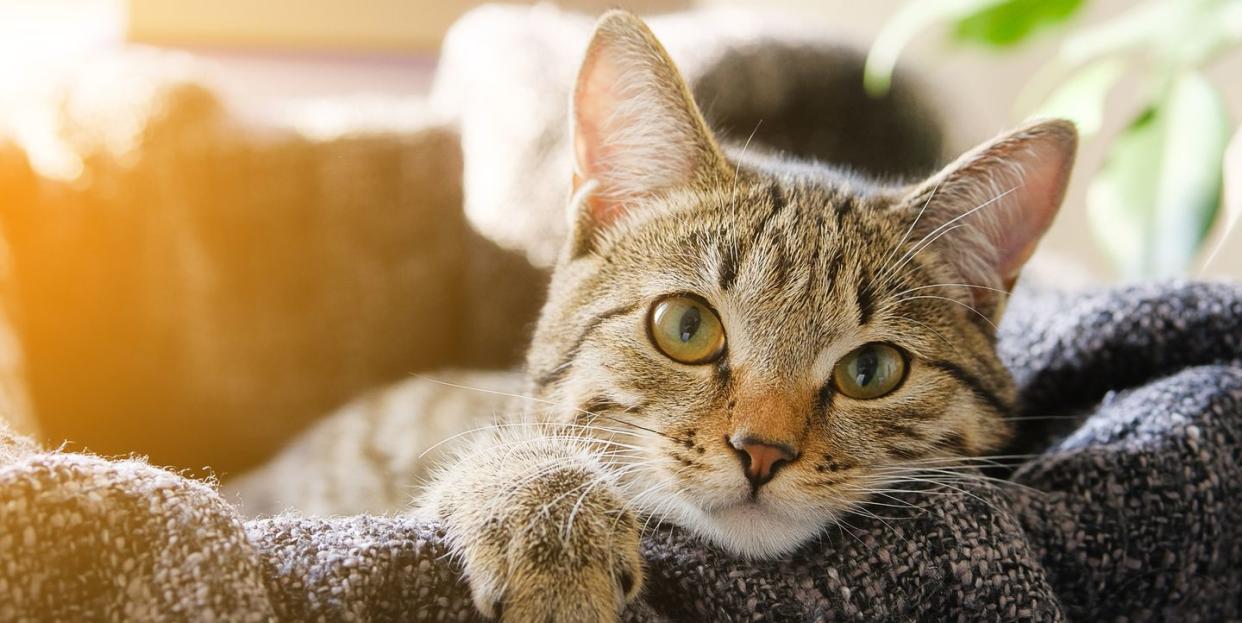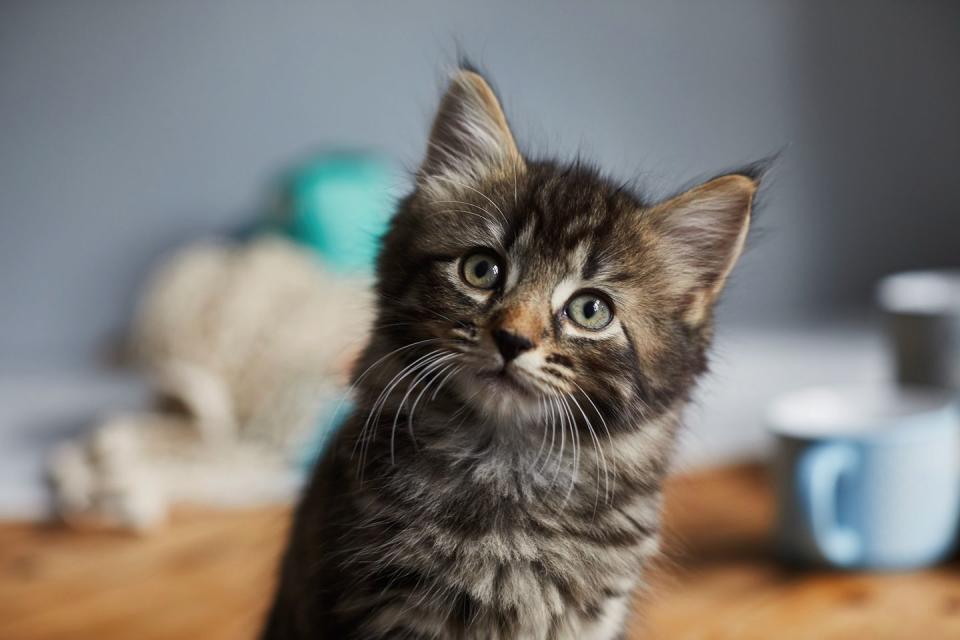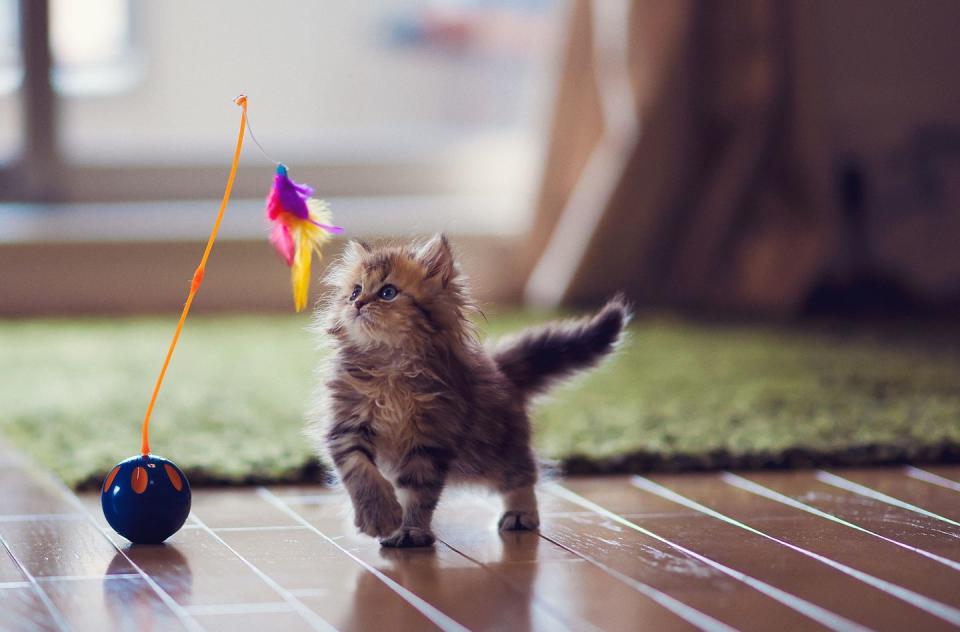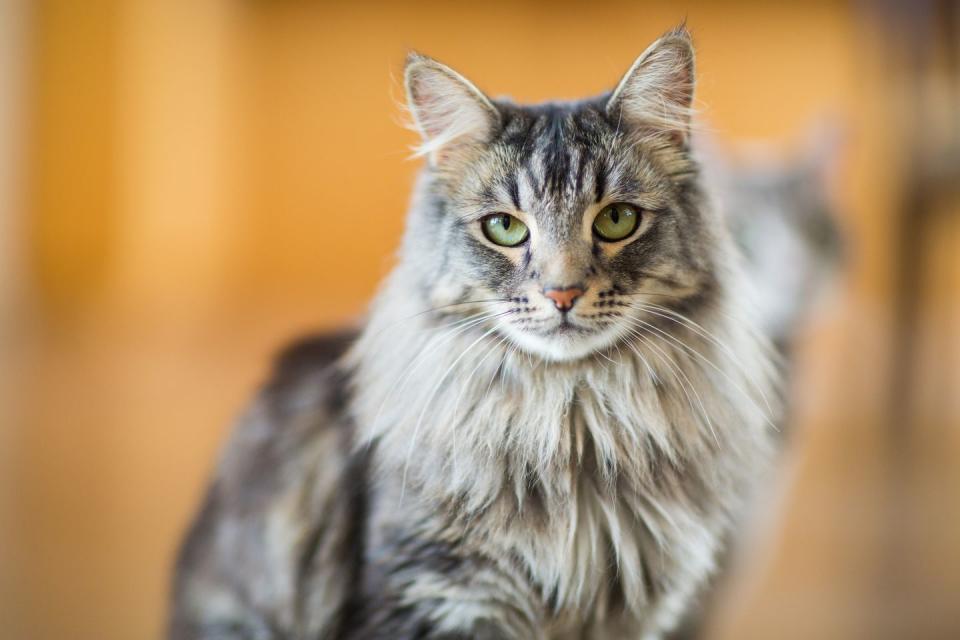9 Signs That Prove Your Cat Loves You More Than Anything

Real talk: Does this cat love me, or does it love what I can do for it? It's a question many a cat parent has pondered.
Dr. Mikel Delgado, a cat behaviorist, confirmed that cats can, indeed, feel affection for humans. “Cats can have a lot of the same emotions that we do, including liking to be around us and enjoying our presence,” he says. “I believe they are capable of enjoying relationships with us and even loving us. ”
Cats derive pleasure, safety, and comfort from their relationships with humans. However, all cats express their happiness with their human companions differently. Long story short? Cats have distinct personalities, just like people.
“Some cats are more affectionate than others, or they're more obvious with their affection,” Delgado explains. "For some cats, the way they show they love you is to want to be in the same room with you. For other cats, the way they show they love you is sitting on your chest and purring in your face.”
Delgado gave us tips for interpreting cat behavior, no matter what kind of feline you have, you can see once and for all, that your cat does indeed love you.
Step one? Make sure your cat has been socialized.
Cats can love their humans—but not all cats can love the way we want them to. In order to make a great pet, it helps if a cat has become accustomed to human behavior from a young age.
Delgado cites a “sensitive period” in a kitten’s coming-of-age, between two to nine weeks, during which they become comfortable coexisting with people. “Kittens that are handled by people at that time are going to be more open and trusting of people later in life,” Delgado says. Dr. Sarah Nold, staff veterinarian at Trupanian, suggests that adopting a kitten up to seven weeks old for the speediest bonding.

When the sensitive period is over, a kitten can still learn to love a human—but it’s a slower process. Even though cats are a domesticated species, they’re able to live independent of human care. A feral cat, for example, would never be wholly at ease with people; and likely, vice versa. “It’d be like trying to tame a squirrel or raccoon. You wouldn’t end up cuddling a raccoon,” Delgado says.
As for homing stray cats? That's a go, in certain situations. “Some cats that live outside do get a lot of exposure to people—they just may have never lived in a home. They learned, through association, that people are good. They bring me food, maybe I should trust them. But it'll be an adjustment to living indoors," Delgado says.
Then, look out for these behaviors.
They treat you like you’re a cat. When cats don't feel threatened by other cats, they will show affection by rubbing on them, sleeping near them, and being in their presence. If your cat replicates those behaviors with you, Delgado says it has officially imprinted on you.
They rub against you. Delgado says this is the "telltale sign" your cat has accepted you into its social group.
They follow you into a room. If a cat is following you around, that means it wants to be around you, according to Delgado.
They come into your bedroom while you're sleeping. Some cats are threatened by a humans' size. As a result, they may feel safer around humans when they're lying on a bed, compared to walking around.
They blink their eyes slowly. Happy cats tend to blink their eyes slowly and softly. Humans can mimic this gesture, and communicate with their cats. "Softening your gaze is definitely a good way to take the tension out of the space," Delgado says.
They knead their paws like a kitten. Ever seen your cat pushing in and out with its front paws? That's a gesture kittens make when they want their mother to release milk. "When they do that to you, it's like you're mommy," Delgado says, and it's another sign your cat is comfortable with you.
They make the right kind of meow. According to Delgado, "meowing" is a way for cats to communicate with people. "It's a very effective way of pushing buttons and pulling at our heartstrings and getting us to do whatever they want, whether it's giving them treats or attention," Delgado says.
They show their belly—in some cases. Some cats expose their bellies as a sign of relaxation and trust. Other cats, according to Delgado, show their bellies because they want to play.
They show their tail, too. Once again, the meaning of this gesture depends on the cat. "Some cats only have an active tail when they're irritated," Delgado says. However, it can also be a sign of affection.
In order to see these behaviors, your cat needs a comfortable environment.
According to Delgado, the key to a cat's happiness is setting up an environment in which cats can express behaviors that are natural to them. Be the doer of everything the cat loves: Providing treats, and playing hard to get. Also, Nold suggests getting your feline friend a climbing tree.
"Then, cats can really build trust and a bond," Delgado says.

These rules hold true for all breeds of cats.
Generally speaking, Delgado says, cat behavior is consistent between breeds. Whereas dogs were bred to replicate different behaviors, the same isn't true for cats, which were bred for looks—not personality.
"Some breeds are very active, like Abyssinians, and Siamese are known to be vocal, but as far as like body language and interactions with people, they're general across all cat breeds," Delgado says.

If you want your cat to love you, play hard to get.
As a cat owner, your impulse may be to immediately cuddle with your buddy. But Delgado recommends letting your cat take charge of interactions. “We know from research that cats actually prefer to be the one to approach you. And if you let them make the first move, you'll have a better interaction," Delgado says.
Over time, Delgado adds, your cat will trust you more, because you respect its limits. This dynamic explains why people who are allergic to cats tend to complain that cats love them. "They're totally avoiding the cat—and the cat is like, Ooh, I want to sit on that person because they're not being pushy."
Finally, find a cat that fits your lifestyle.
All cats have different personalities. Sometimes, it's possible to ad0pt a kitten or cat with a certain kind of personality. Nold says humane societies and rescue centers work with cat behaviorists to evaluate cats' personalities. "Share what you're looking for the center you're adopting the cat from, " Nold says.
For more ways to live your best life plus all things Oprah, sign up for our newsletter!
You Might Also Like

